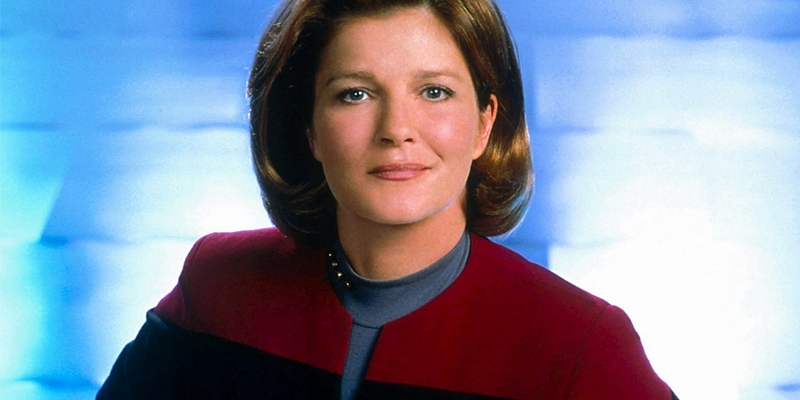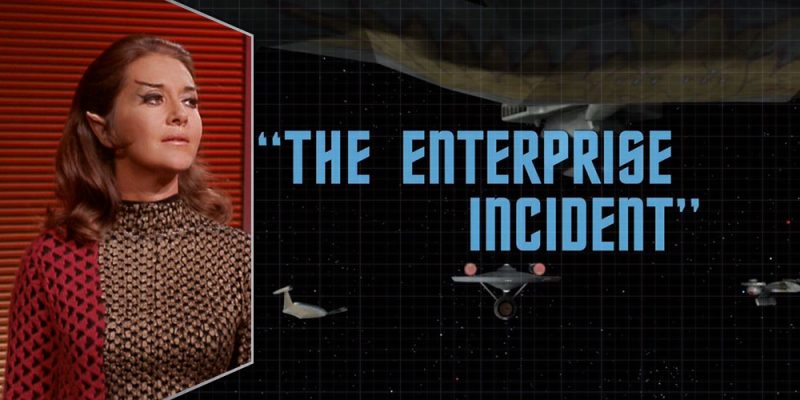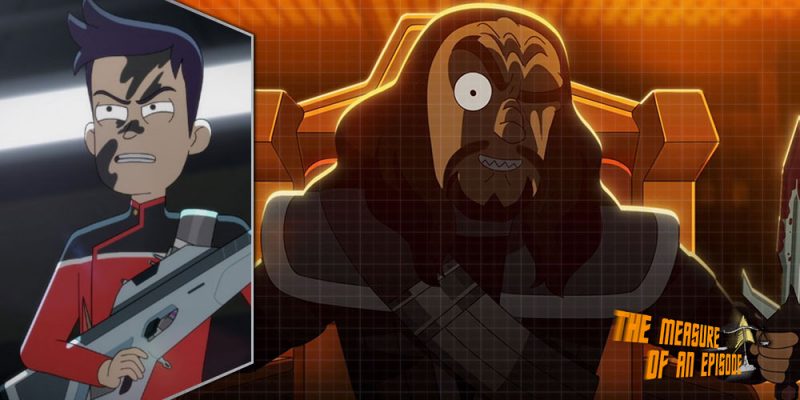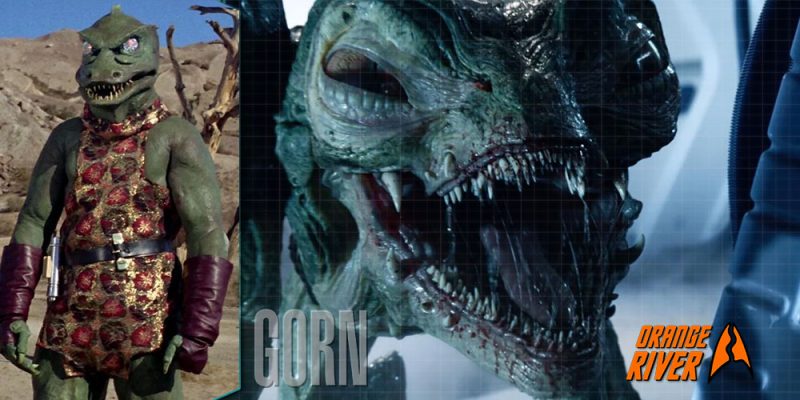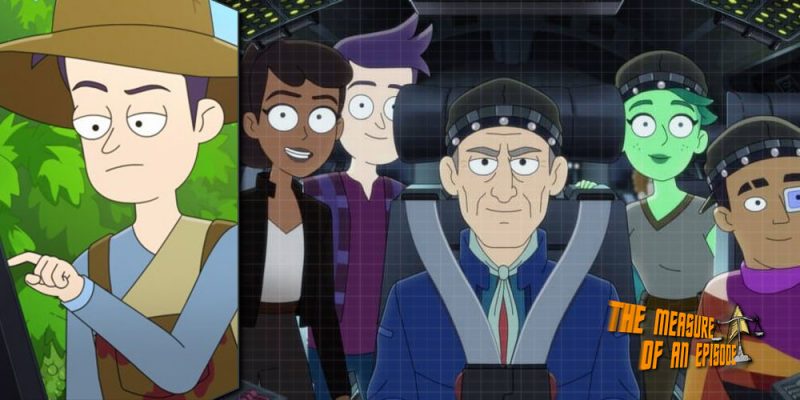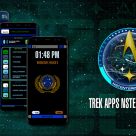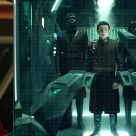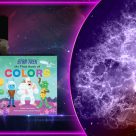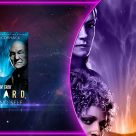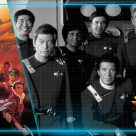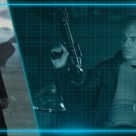People ask me all the time: “Why did you become a teacher?”
It’s not an easy question to answer, and to be honest, my answer changes once in a while because of what I know now and where I have been. The admiration and esteem with which I regard the teaching profession is deeply rooted in my childhood. As challenging as it may be to meditate on my identity, I have come to understand that a deep understanding of the self lends itself to the field of education, and therefore I feel compelled to explore my own ethnography.
When I was a little girl, Wednesday nights at eight o’clock were reserved for my dad and I to watch Star Trek: Voyager together. This is the only memory I can recall of ever spending much time with my father growing up. The hour-long science fiction series transported me to other worlds and inspired me to dream of bigger, better things. Brave Captain Kathryn Janeway and her faithful crew had been stranded 75,000 light-years from Earth and it would take them 75 years to get home. In 1998, my mother filed for separation from my father and I found myself struggling to find my way home in the midst of a nasty custody battle. During those turbulent, tear-filled years, I kept a journal in which I addressed my troubles and queries to the one person I knew I could always rely on to set me right again: Captain Janeway.
Of course, I knew that Captain Janeway was just a character from a television show, but I admired the actress who played her as well. Kate Mulgrew carried such an extraordinarily confident presence onscreen that I could not help but be completely enamoured with her. Back then, however, it was difficult to separate the two. During my “Voyager years”, as I call them, I made every effort to be just like Captain Janeway. I tried styling my hair like hers, even changing my voice and physical mannerisms to match hers in every way. After all, she was beautiful and highly intelligent, not to mention witty and compassionate; most of all, she was completely dedicated to those in her care. The separation between my parents progressed inevitably into divorce proceedings.
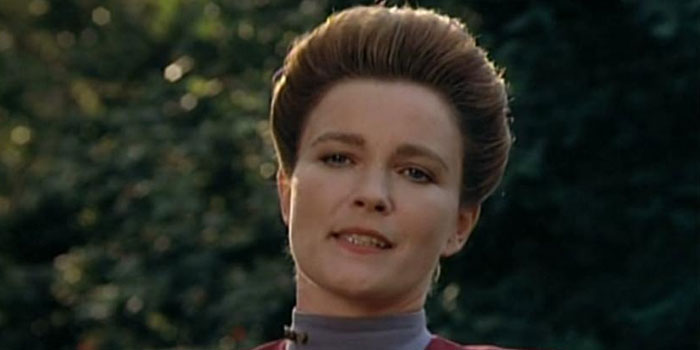
Suffice it to say (see what I did there? *sigh* Janewayites’ll get it!), public school was an absolute nightmare for this sensitive little girl who sashayed around as if she was on a television set all the time, talking in a strange voice and constantly babbling on about “bio-neural gel packs” and “hyposprays”. No one understood me, so I retreated further into my imagination (as well as syndicated late-night re-runs of Voyager). I spent countless hours scribbling down “Trekno-babble” and quotes from the show that I liked, particularly those spoken by Captain Janeway. If anyone made fun of me at school, I would ask myself, “What would Janeway do?”
My fascination with Janeway lessened slightly after Voyager ended in 2001, only to be replaced with a paramount obsession to track the professional career of Kate Mulgrew. My dad took me to a sci-fi convention (Grand Slam Pasadena) where Kate gave a talk, during which I realized that the actress herself was very similar to the character she had portrayed on television. When it came time for her to answer questions and respond to comments from her fans, I wanted to go up but I lost my nerve.
It didn’t matter after all because another little girl walked right up to the microphone and shouted, “I want to be just like you someday!” Kate smiled, kneeling down beside the little girl and said, “I don’t want you to be like me, I want you to be yourself!” It was at that moment that I knew what a true role model should be; it was at that moment when I realized that the woman I had “unnaturally idolized” from the age of 5 was truly a unique human being.
While my peers were listening to the Spice Girls, Missy Elliot (big fan NOW, by the way) and N*Sync, I was listening to Kate Mulgrew, my hero, tell me that it was okay to be myself that I was good enough. Suddenly, I felt an enormous wave of peace come over me and I finally felt that I was going to be okay. Consequently, I became extremely interested in acting, which eventually turned into the singular most important thing to me.
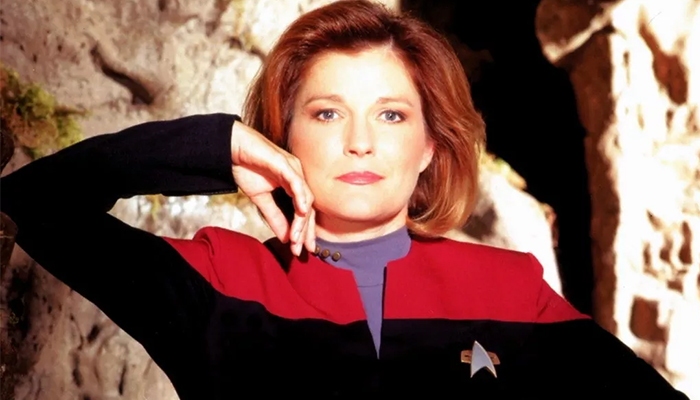
Kate reminded me a great deal of Katharine Hepburn and in 2004, she was cast in a one-woman show called “Tea At Five” that opened in Hartford, Connecticut and eventually made its way to the Pasadena Playhouse. Naturally, I begged my father to take me as I did not yet have my license and ended up sitting in some of the worst seats (that’s what Student Rush tickets get you), but I was there! During the intermission, the woman seated on my left leaned over and asked how I liked the show, to which I responded that I loved it and that Kate’s performance was outstanding. She agreed and introduced herself to me as Paula Ewin, and she was Kate’s understudy.
Stunned, I blurted out a silly request for her to “Thank you, Ms Mulgrew, for being such an inspiration and tell her there’s a fourteen-year-old girl out here in the balcony who is her biggest fan.” Paula, being a consummate professional and gracious soul, smiled warmly at me and said she would send my best wishes to Kate. She also said she was certain Kate would love to say hello to me in person if she didn’t have to be on a flight to New York immediately following the curtain call. Still and all, it was a great privilege to have met Paula and to have seen Kate in action on the stage, portraying the legendary Katharine Hepburn, who had passed away the previous year.
I did eventually meet Kate four years later in Las Vegas. By this time, I was in my senior year of high school and had been acting, directing and stage-managing tirelessly, all the while following Kate’s career. My father and I made the five-hour drive out to the “Oasis in the Desert” for the annual Star Trek convention at the Las Vegas Hilton Hotel. I found myself meandering throughout the Vendors Room, chatting up other convention-goers and perusing various offerings of memorabilia.
I circled back around to find my dad standing in the middle of the walkway with an expression of knowing on his face; he was also hiding something behind his back. When I asked him what was going on, he smiled and placed in my hand a voucher for a photo op with none other than Kate Mulgrew. I immediately burst into tears, flung my arms around him and thanked him repeatedly before making a bee-line for the photo op queue. I stood in line for what seemed like hours, agog with excitement. When it finally came time for me to have my photo taken with Kate, I stepped up quickly and smiled. I was then whisked away rather abruptly and found myself wondering what had just happened. Did that even happen just now? After all that waiting and anticipation, the whole experience of actually having my picture taken with my childhood hero lasted all of two milliseconds. If I didn’t have the photo in my hand right now as proof, I still wouldn’t believe it! But it did happen, and as soon as the adrenaline rush subsided, a comforting recollection struck me: Kate had thanked me! Yes, that’s right, now I remember! Just as I approached her, she smiled and thanked me for waiting so long. What a classy lady!
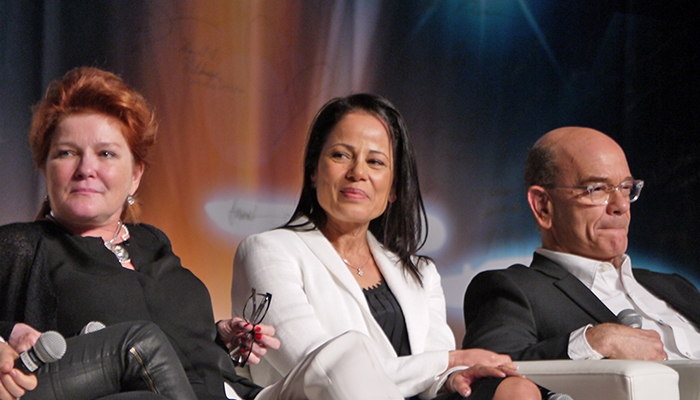
Last year, Kate landed herself the role of a tough Russian inmate in a women’s prison named “Red” on the enormously successful Netflix original series, Orange is the New Black. She had just completed her memoir, Born With Teeth. It’s funny because I can name every role this woman has ever played and every television series or movie she’s been in, but I cannot say I really understand who she is as a person, which is why I am excited about this book she wrote.
Her interviews reveal her biting wit and humility, but she very rarely talks about her personal beliefs in public. She describes herself as a liberal Democrat who adamantly opposes capital punishment and abortion because she believes “all life is sacred” (Mulgrew, 2001). It is hard to answer the question of how my role model has persuaded me to accept her worldviews because I know so very little about them.
She is known for her professionalism and her intense dedication to the art and craft of acting. She is also known for her humility and a strong sense of purpose-driven action. I will say this: she appears to be incredibly honest and forthright about her regrets, which makes me respect her even more. I share her belief that all life is sacred. At the end of the day, what is most important to focus on is how you treat other people, not how they treat you. When I look back on all of the time I have spent admiring someone I don’t know instead of, say, my mom or a teacher, I have no regrets. I know that I chose someone worth looking up to and respecting. Captain Janeway taught me how to remain composed under pressure, as well as what it means to make sacrifices for others; Kate Mulgrew taught me that being myself is good enough and to stand by my beliefs, no matter what.
Kate taught me that.
In my case, my mother was actually my teacher for the first eight or nine years of my existence, but much of the education I received whilst being schooled at home seems to have been lost in a sea of tears and blown-out vocal cords, replaced by the thread-based Forum RPGs and endless re-watches of Voyager. And Captain Janeway. You can only imagine the jealousy that enshrouded my relationship with my mother. Every chance she had to put down the show or my fandom of Janeway/Kate, she went there. She believed my obsession was “unnatural” and even wanted me to see a child psychologist. I am sure, even though I really had no idea then, she sensed I was gay, and that was the problem.
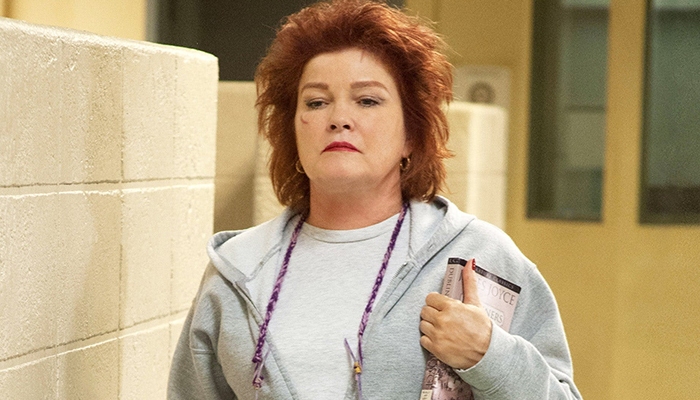
My sexuality never really seemed unnatural to me. I came out as bisexual at 14, then claimed the mantle of full-on lesbian around the same age. It was a non-issue for so many years, even though I was open about it at school until I finally had to confront my mother. The “bullying” I endured was surreptitious, subtle and sneaky. No one had the courage to face me, so it came in the form of whispers and those God-awful glares in the changing rooms during swim unit. My sister outed me in front of my dad one day. We never really got along very well, and this was just another tactic to embarrass me, which worked.
When it was all over, I ended up having quite a good relationship with both of my parents where this part of my identity is concerned. My mother and I went on a little trip together, read this book about a woman whose son was gay, and we resolved to forgive and accept each other. Now, my mother gets on very well with my wonderful girlfriend, and we are closer than ever before. My dad never really held it against me, even though he was raised to believe being gay is a choice, and he said he loved me no matter what. My issues with him have nothing to do with how or what he thinks of my sexuality. He has always been nice to my partners, and he would be at my wedding if I were to get married, no problem. I’ve been lucky to have my family’s love and support, and trust me when I say that I don’t take it for granted.
As my parents’ marriage began to degrade, so did the concept of what it meant to be a good student, a good daughter and, perhaps most importantly, a good maternal influence. My mother seemed to split apart at the seams-even the follicles of each strand of dark auburn hair seemed to burn alight with hate and resentment. Her eyes were wild and tear-filled. Life as I had known it was over. But it went on a little while longer with Janeway and her crew teaching me about resilience and perseverance every step of the way at least until the show ended. I still don’t believe that people seem to understand just how deeply traumatic divorce is, especially for the children involved. We all simply “moved on”. No counselling. Just a lot of nasty gossip and sadness. My parents had each lost themselves.
Education, mentorship and partnership vanished within a matter of weeks. From that moment, I began to journal everything I saw and felt with the fervour of a puppy at play. I wanted to be able to give myself something to look back on in case I forgot what I wanted for myself as a young girl. I actually worried that I would forget about my dreams and aspirations!
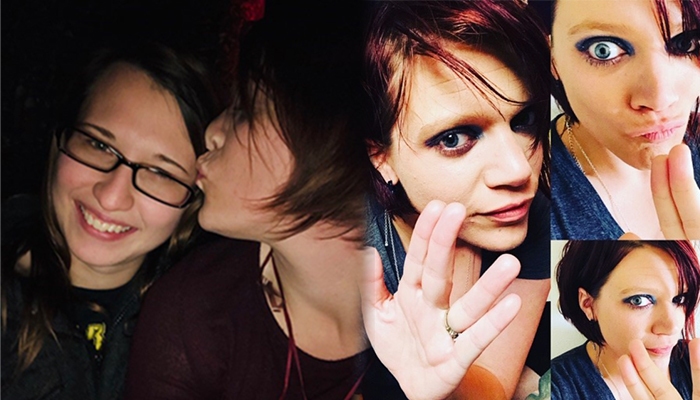
As time went on, however, my desire to be what my mother had once been and faded away from became a new breed of obsession. I transformed the admiration for Captain Janeway into a set of ideals that I would use to become a teacher and a leader. My mother’s image was tarnished, but I still held onto a few scant memories of our time together before the split. Our education was based on what everyone now officially recognizes as “Inquiry-Based Learning”. We started with a real-world problem or question and tapped into a variety of skill sets to address these concepts by researching, making connections and creating visually interesting models or other types of projects to show what we had learned.
Once I began public school in America, I felt immediately disoriented. My third-grade teacher, Mrs Saunders, noticed that my understanding of basic mathematics was well below where it should have been. I could have let this discovery deflate the balloon of my self-esteem, but I recalled the strength and bravery of Captain Janeway, and I decided to stay every day after school to get my math skills up to scratch. I recalled how much Janeway loved math and science, and why. I also wanted to spend more time with my teacher because I wanted to learn about what being a classroom teacher was like in the States.
Mrs Saunders was tall, with fluffy auburn hair and a gaunt face. The other students thought she was mean, but I was fortunate to have spent more time with her and knew this was not so. She was somewhat gruff, but when she stood up to the bullies who loved to tease me because I spoke funny, it became clear to me that she cared about me and had a clear mission as a teacher, a sense of social justice. Her dedication, even at her age, spurned my belief that I would follow in her footsteps. As I continued on my journey through adolescence, I connected with two other people: my French teacher and my Theatre Arts teacher. These were two vastly different women, but each of them provided a great deal of insight and taught me about educational philosophy. My mother and I fell out several times and didn’t speak to each other through much of my high school years. It was one of the most painful chapters in my life.
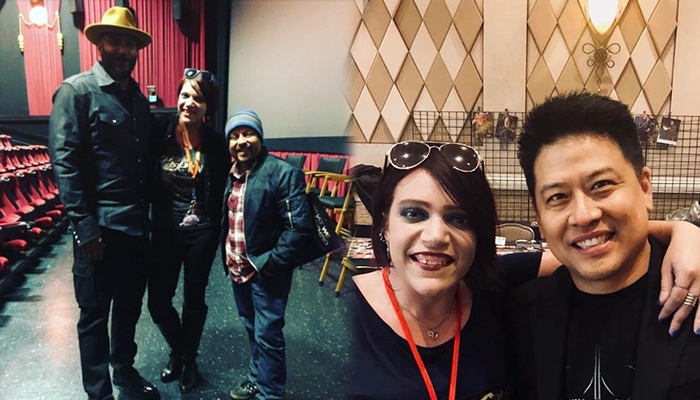
Madame Shea was somewhat jaded, but she always seemed to want to push through her resentment of the public education system by remaining as progressive as possible where her teaching style was concerned; she was an avid supporter and employer of technology in the classroom. The students never appreciated her efforts, but I did, and I saw them as incredibly useful in teaching a foreign language, so I promised that I would follow suit. Conversely, my Theatre Arts teacher was a quirky, but conservative Mormon woman whose devotion to her religious beliefs drove her personal mission in teaching whose focus was on essential skills. She set strict standards of appropriateness with us, but she was also a great deal of fun. In spite of the strict moral code she followed, she was a tremendous mentor to me in so many ways. She did not mind if we did not place at competition, so long as we took home the Spirit Award; she did not mind if we won or lost, but if someone missed their cue even so much as by a beat, we knew she would be backstage in a flash like the Wicked Witch of the West, red hair afire and green eyes burning like white-hot coals. The one most important aspect of my personality as a teacher, particularly when it comes to performing arts, that I thank her for every single day, is my sense of discipline.
While it was the discipline that allowed me to muster the courage to do well in high school, it was also out of a sense of desperate determination to escape my family life, and it is also what prepared me to enter military service at only seventeen years old. I wanted to become a better educator, and I wanted to get away from the chaos at home, but I also wanted the opportunity to be a part of something even greater than myself. Productions and competitions, directing, stage-managing and acting were simply not enough; I yearned for a taste of the real world. The Army was more than happy to give me my fair share.
Within just 10 weeks’ time, I was a fully soliderised Linguist in the United States Army. During my time at the Defense Language Institute, I acted as a liaison between the French language and the military officers, all of them high-ranking Full Birds, SEALs or Foreign Area Officers. I assisted them in acquiring the level of fluency they would need to attain at the end of the 6-month period in order to be successful in their respective missions. As an educator, I want my students to value their own voices. A democratic classroom is the most effective one because my goal is to prepare each student for success on whatever path he or she chooses to follow.
As closely as I identify with Progressivism as a teacher, I have a strong desire to encourage students to challenge their own preconceived notions about the world around them. Students need mentors who push them to think beyond the moment, as well as to think beyond their own needs. I suppose this makes me a bit of a Social Reconstructionist in the sense that I want my students to take their own pulse, then take the pulse of their environment and find out where they can fill a need. It may seem naïve to want to make the world a better place, but history has shown that one person can make a difference-I see it in the news every day, and I have personally witnessed change happen around me. If being a Progressivist is mainly defined as wanting students to feel as though their voices matter in the classroom than why shouldn’t their voices matter beyond those four walls?
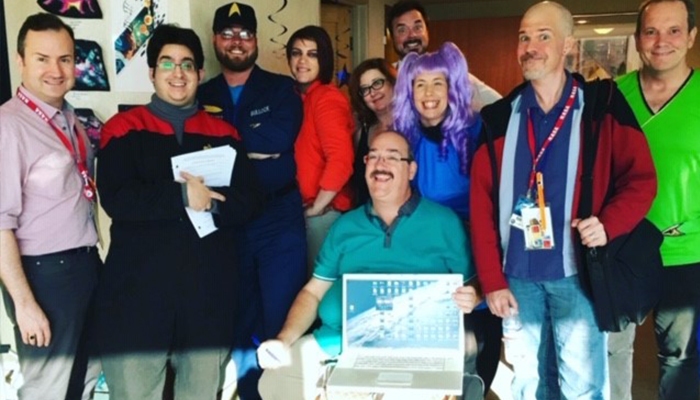
A ”highly effective teacher” should “be prepared to engage all students”, regardless of the lack of ethnic diversity in the classroom; failure to do this would show a lack of respect for social justice, equity and teaching as a profession; failure is not an option! I intend to exude the characteristics of strict, but fair and fun, but firm teaching style. I set the standard of excellence as high as possible, even for those with learning disabilities, because I believe they can learn and grow beyond their diagnoses if given the right amount and type of support. It would be a lie to say that Kate’s influence on me has completely faded away. I still light up whenever I watch an episode of Star Trek: Voyager or Orange is the New Black. She continues to serve as a compass of sorts in my life.
At almost 30, I still ask myself from time to time, “What would Janeway do?” If I never have the chance to really sit down and tell her how much her words that day at the convention meant to me and my life, it would not bother me because I know that I still got what I truly wanted from her in the end: to be her.
Well, guess what? I am Captain Janeway.
When all is said and done, the schema I have developed over the past 29-going-on-30 years of my life has significantly impacted my identity. There have been many people and places that have greatly impacted my perspectives on life, love and identity. Despite the obstacles and barriers in my way, I am eager to see where the kids take me; I am alight with curiosity to find my place within their learning community. I want to know who they are, where they come from, what their struggles are and how I can remain connected with the intricacies of their environment. I accept and embrace who I was born to be, and I have the courage to do this because I had Janeway to show me how.
SHOP LGBTQ+ TREK
READ MORE LGBTQ IN TREK ARTICLES BELOW
- LGBTQ+ In Trek – Pride And Star Trek
- LGBTQ+ In Trek – LBGT Kirk And Me
- LGBTQ+ In Trek – Discovery’s Chosen Family
- LGBTQ+ In Trek – The Action Begins In the Lower Decks
- PRIDE MONTH – LGBTQ+ In Trek – Star Trek, LGBT & Me
- PRIDE MONTH – LGBTQ+ In Trek – The “Woke” History Of Star Trek
- PRIDE MONTH – LGBTQ+ In Trek – Stepping In From The Outside
- Talking Queerness, Star Trek & Celebrating Trans Visibility
- Diversity in Trek – “No Longer The Outcast”
- Diversity In Trek – Why Representation Matters
- Finding Headcanons And Queer Representation In DS9
- Star Trek Casts Its First Transgender & Non-Binary Characters In Discovery S3
- LGBTQ+ In Trek – “Finding My Queer Representation Near the Celestial Temple”
- LGBTQ+ In Trek – “WWJD: What Would Janeway Do?”
- LGBTQ+ In Trek – Still, The Stigma

